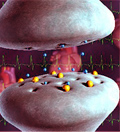The eLitMed.hu medical portal uses computer cookies for convenient operation. Detailed information can be found in the Cookie-policy.
LAM Extra for General Practicioners - 2009;1(04)
Content
[CHRONIC COUGH - THE OTOLARYNGOLOGISTS’ POINT OF VIEW]
[Chronic cough can have a profound impact on the psychosocial function of patients. Most studies agree that post-nasal drip syndrome (PNDS), asthma, gastro-esophageal reflux disease (GERD), and laryngo-pharyngeal reflux (LPR) are the most common causes of chronic cough in immunocompetent, non-smoking patients who are not taking angiotensin-converting enzyme (ACE) inhibitors and present with a negative chest x-ray. No diagnostic test has yet been found to define those who have PNDS other than the response to a first-generation antihistamine. Examination of the available evidence suggests that the theory of mechanical stimulation of the pharynx by mucus does not explain the occurrence of cough. Inflammatory mediators’ levels in the lower airways are higher in PNDS, cough variant asthma, and GERD, and the theory that an inflammatory process is affecting “one airway” is a plausible one. Nasal disease is more likely to result in cough from the co-existing involvement of the lower airways through a yet undefined pathway. Mediation by eosinophil and mast cells appears to be a likely mechanism. In this paper, the author summarizes all potential pulmonological, otolaryngological and other reasons of chronic cough, suggesting a systematic therapeutic algorithm.]
[EFFECT OF BETA BLOCKERS IN HYPERTENSION, ISCHAEMIC HEART DISEASE, HEART FAILURE AND METABOLIC SYNDROME]
[Beta-blockers are among the most widely used drugs for the treatment of cardiovascular diseases. In the mid-90’s, these drugs were recommended as first-line therapies of hypertension. With the introduction of new drugs, the list of first-choice drugs has been extended. The results of recently published major hypertension trials, which compared conventional agents (beta blockers and/or diuretics) with newer agents (angiotensin converting enzyme inhibitors, Caantagonists, angiotensin receptor blockers), raised concerns regarding the role of beta blockers in cardiovascular primary prevention. Subsequently, a metaanalysis of 13 trials has shown that compared with other drug types, beta-blocker therapy is less beneficial in patients with hypertension who do not have heart disease. Nevertheless, in cardiovascular indications other than hypertension (acute myocardial infarction, heart failure and arrhythmias), betablockers retain their dominant position.]
1.
Clinical Neuroscience
[Headache registry in Szeged: Experiences regarding to migraine patients]2.
Clinical Neuroscience
[The new target population of stroke awareness campaign: Kindergarten students ]3.
Clinical Neuroscience
Is there any difference in mortality rates of atrial fibrillation detected before or after ischemic stroke?4.
Clinical Neuroscience
Factors influencing the level of stigma in Parkinson’s disease in western Turkey5.
Clinical Neuroscience
[The effects of demographic and clinical factors on the severity of poststroke aphasia]1.
2.
3.
4.
5.




